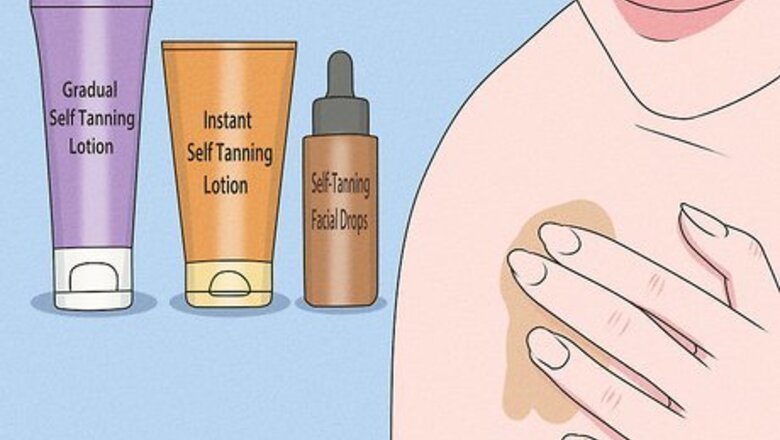
views
Preparation
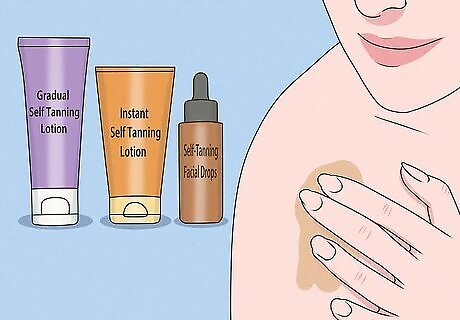
Choose a type of self tanner. There are so many self tanning products out there, it can be difficult to choose one that will work for you. Some formulas allow you to build a tan gradually over the course of a few days or a week, while others immediately stain your skin bronze. Some are long-lasting, while others wear off after a week or wash off at the end of the day. Figure out which product is best for your needs: Gradual self-tanning formulas. These come in the form of creams, gels, sprays or foams. Gradual self-tanning formulas usually contain either dihydroxyacetone (DHA) and Erythrulose, both of which work by reacting with the amino acids on the skin surface to create a darker complexion. One application will darken the skin by just a shade or so, but you can keep applying the product over the course of several days to achieve the color you want. Instant tanning formulas. Most instant tanners are sprays that you can apply immediately for a sun-kissed look. Some stay in place for about a week, while others can be washed away at the end of the day. Instant formulas are trickier to apply than gradual formulas, since they stain the skin right away and might leave streaks. Face tanning formulas. Look for a self-tanner designed for use on the face if yours is on the sensitive or oily side. While most self-tanners work on the body and the face equally well, you'll want to get one specifically for the face if your skin is a little finicky. Pick the right color. If you have fair skin, choose a light to medium color. If you have olive skin, choose a dark formula. You can always reapply the self-tanner to deepen your tan if your first application looks too light.
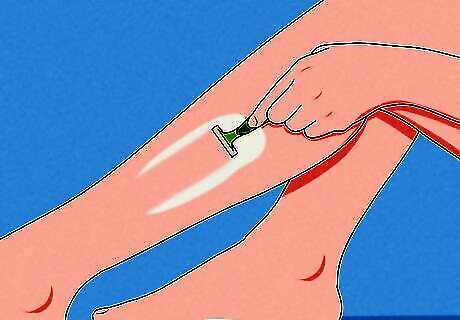
Remove thick hair from the places you want to tan. Thick hair can get in the way of self-tanner when you're trying to apply it evenly. You might want to shave or wax your legs (and arms, if necessary) to ensure you'll be happy with the final appearance of your tan. If you have fine hair on your legs or arms, there's no need to remove it before tanning unless you want to. Guys might also want to shave or wax the chest or back before applying self tanner.
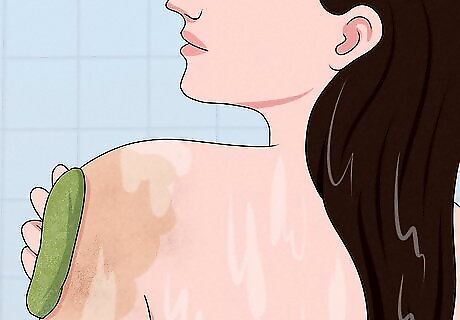
Exfoliate your skin. No matter what your skin type, is, it's best to exfoliate well in the shower before tanning. When your skin has dry, flaky patches, it's a lot harder to apply self-tanner evenly, and you'll end up with a patchy look instead of a pretty finish. The chemicals in self tanner react with amino acids in the upper layers of your skin. By removing the uppermost layer (which would've sloughed off on its own soon anyway) you're ensuring that the tan develops in a fresh layer that's going to be around longer. Also, dry skin tends to absorb more color, increasing the likelihood of an uneven tan. To exfoliate, use a washcloth, a scrub brush or scrub gel to thoroughly exfoliate all of the areas you're tanning. Focus on rough spots like your elbows and knees. The self-tanner tends to darken these areas more than other parts of your body, since it soaks in faster. Rough skin will cause the application to look even more uneven. Moisturize the skin after exfoliating, particularly if your skin is dry. Pay attention to areas like the knees and elbows where tan can build up. Use lotion or oil to trap the moisture in your skin after your shower. Allow it to fully absorb into your skin over an hour or so before you apply the self-tanner. Try to exfoliate at least 8 hours before applying the tanner. This gives your skin's pH time to neutralize, which will help the color develop.

Dry off. It's important that while you're applying the self tanner, your skin is completely dry. If you're going to be in the bathroom, wait for any humidity from the bath or shower to subside. Make sure it's cool enough wherever you are so that you don't sweat for the next few hours. Make sure you aren't wearing any makeup, lotion, deodorant, old tanner, or any other products that could get in the way of your new tan.

Allow several hours for the tanning process. A rushed self-tanning job is immediately obvious. You'll miss some spots, have streaky areas or stain your clothes and hands. Do yourself a favor and set aside several hours so you can make sure you have enough time to thoroughly and evenly cover each area you're planning to tan.
Application
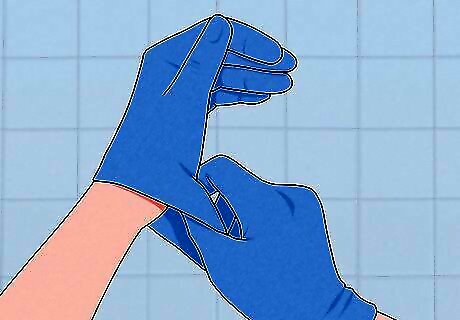
Use a tanning mitt (available in most drugstores) or put on a pair of latex gloves. This will protect your palms from turning 'orange'. The palms of your hands don't naturally tan, so if you get self-tanner on them it'll be a dead giveaway that your tan came from a bottle instead of the sun's rays. If you don't have latex gloves or a tanning mitt handy, you can wash your hands with soapy water throughout the process to remove self-tanner. You may also want to protect your bathroom surfaces by putting down an old sheet or a plastic tarp and applying the self-tanner while standing on it. Keep nice towels and other items out of the way. Self-tanner is known for creating tough stains.
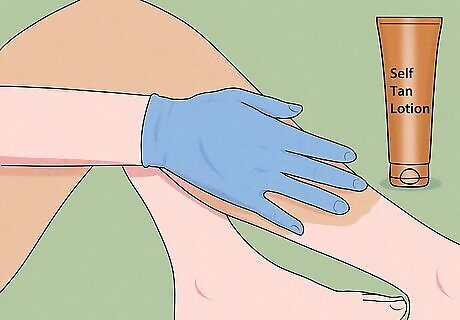
Apply it to your legs, torso and arms. Working from the ankles up toward your torso will result in a natural-looking tan. Squeeze a small amount of tanning product into the palm of your hand. Spread the tanner over your skin in broad circular motions. Follow the instructions that came with your formula to determine how long to rub it in. Apply it to one body part at a time so you can be sure not to miss any spots. If you're using a spray tanner, follow the directions regarding how far you should hold the can from your body and how long you should spray any given area. Holding it too close or spraying too long could result in an uneven tan. Around your feet, spread the tanner from your legs onto your ankles and the tops of your feet, and use as little as possible in this area. Don't apply any to your toes, heels, or the sides of your feet, since these areas don't tan much naturally. It may be a good idea to use a makeup brush for this step, so you can really blend it in well. If you're applying it to your back, use a strap or a band for even application. Better yet, ask a friend to help you out. If you aren't wearing gloves, use a timer and make sure you wash your hands every five minutes, scrubbing under and around the nails. While most people don't have tanned underarms, avoiding that area can be difficult, so it's better to apply self tanner there and lightly wipe with a damp washcloth about five minutes later.
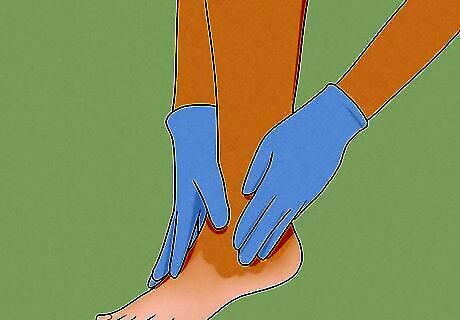
Blend at the ankles, wrists and joints. Blending the tanning lotion with a regular lotion around the ankles, wrists, knees and elbows will result in a lighter, more natural-looking application around these areas. Any type of regular moisturizing lotion works well. Apply a very small amount of regular lotion to the tops of your feet (if you are using gloves, rinse them in water and dry them to ensure no additional tan will mix in with the moisturiser, or wash hands afterwards) and blend it with the tanner that you've already applied around your ankles. Apply a small amount of regular lotion around your knees, especially just below the knee. Do the same thing to your elbows, especially the part that puckers when your arm is straight. Use plenty of lotion on your hands, and blend it into your wrists.

Apply it to your face and neck. Apply the tanner sparingly on your face and neck because that skin will darken easily. Start by applying it to the places where you naturally tan: your forehead, the apples of your cheeks, your chin, and the bridge of your nose. Using a steady circular motion, smooth the tanning lotion outward to cover the rest of your face as well. You might want to apply some petroleum jelly to your eyebrows before you begin, that way the tanning lotion won't collect there and darken the area too much. Be careful not to get too much tanning lotion on your upper lip, as this spot absorbs more lotion than other areas on the face. Don't forget to apply it behind your ears and the back of your neck, especially if you have short hair.

Wait. Avoid contact with anything or anyone for the first 15 minutes, and don't get dressed for an hour. If that's not convenient, you can put on a loose article of clothing, but make it something you don't mind staining. Avoid contact with water or doing anything that'll make you sweat for the first three hours after application. Try to wait 8 hours before showering or bathing again. Avoid exfoliating or using retinol on your skin for several days. Wait at least 8 hours before deciding to apply more tanner. It takes awhile to work, and if you act too soon you might end up too tan! If you feel sticky, you can apply baby powder with a large body powder puff 30–60 minutes after applying the lotion. Don't rub it in, though, or it could affect the finish of your tan.
Finishing

Apply more tanning lotion to bare spots. If you missed a spot or two, don't worry! You can easily correct the problem with a little extra tanning lotion. Put on a fresh pair of latex gloves, rub a dime-sized amount of tanner in your palm, and lightly apply it to the bare spots. Be sure to blend it around the edges so it'll look even when it begins to show up. Be extra careful not to use too much tanner this second time around. If you accidentally spread too much on your skin, wipe it off with a tissue right away.

Rinse in cool water to avoid tan leaking from the skin. Remove tanner from places that are too dark. If you have streaky spots or patches that are darker than the surrounding areas, you'll need to take a bit of the tanner off. This can be tricky, but luckily there are a few different methods to choose from: Scrub the spot in the shower. Use a scrub brush or a washcloth to firmly scrub the spot in question. The tanner should fade a little in that spot. Use lemon juice. Dip a tissue in lemon juice and dab it on the affected area. Let it dry completely and sit for about 20 minutes, then wash it off.
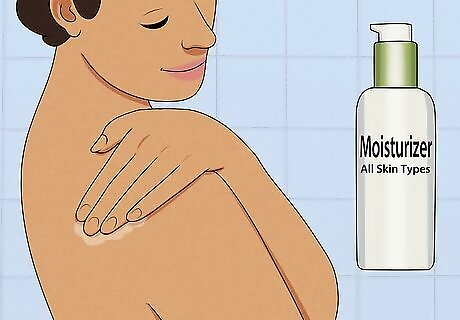
Keep your skin moisturized for a lasting tan. As your top layer of skin dries and begins to flake, your tan will begin flaking away and fading, too. To make it last longer, keep your skin moisturized by rubbing lotion on it every day. Use sunscreen when you go outside, since even bottle-tanned skin needs to be protect from the sun's drying and damaging rays.
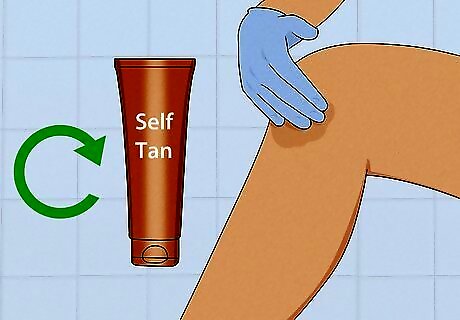
Reapply self-tanner for a deeper tan. If you want to go a few shades deeper, or your tan is beginning to fade, re-apply the self-tanner using the same method you used to begin with. Be sure to apply it evenly so you don't end up with some faded spots and some freshly tanned spots. Gradual self-tanners can be reapplied every few days to subtly deepen your tan.
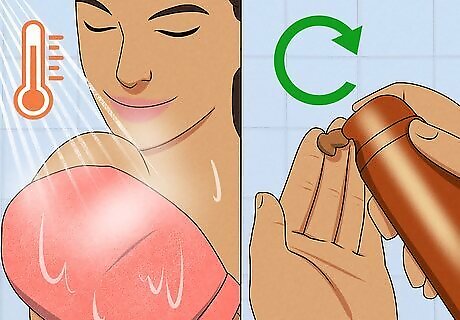
Ensure to completely scrub the tan off at the end of the week, or when you feel you need to re-tan. Use an exfoliating body scrub and/or exfoliating gloves with warm water to really remove the tan. It may take a few washes. Remember to keep moisturising. Then start the whole process again. By forgetting this step, your tan will build up in certain areas, collecting in between the fingers or elbows. Eventually it will become harder to scrub off if you miss this part, and will begin to look patchy. Focus on creating a nice, smooth base for your tan to develop onto.















Comments
0 comment